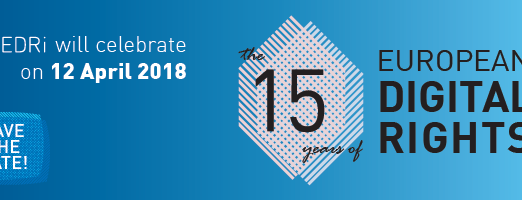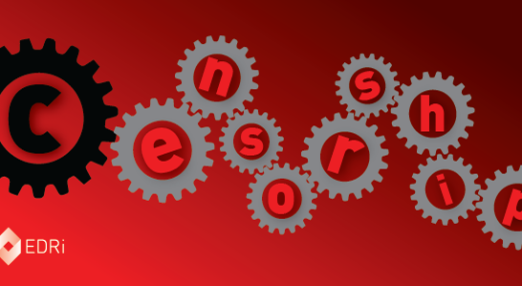Our work
EDRi is the biggest European network defending rights and freedoms online. We work to to challenge private and state actors who abuse their power to control or manipulate the public. We do so by advocating for robust and enforced laws, informing and mobilising people, promoting a healthy and accountable technology market, and building a movement of organisations and individuals committed to digital rights and freedoms in a connected world.
Filter resources
-

EDRi celebrates its 15th anniversary – save the date
European Digital Rights (EDRi) will be celebrating its 15 years of fighting for fundamental rights online. We wish to mark the occasion with a celebration of the enduring passion and energy of the digital rights movement in Europe! The anniversary will take place on 12 April 2018 in Brussels, before EDRi’s annual General Assembly. We […]
Read more
-

Dutch mass surveillance law receives two BBA nominations
Until 9 November 2017 people in the Netherlands could nominate individuals, organisations and companies for a Big Brother Award. The three most “popular” nominees are now in the running to become the biggest privacy offender of the year. Two of the three nominees, Christian Democratic Appeal (CDA) parliamentary party leader Sybrand Buma and the Cabinet, […]
Read more
-

e-Privacy: What happened and what happens next
With the vote on the mandate for trilogues in the European Parliament Plenary session of 26 October 2017, the European Parliament confirmed its strong position on e-Privacy for the following inter-institutional negotiations, also called trilogues.
Read more
-

Is anti-plagiarism software legal under EU Copyright legislation?
Are anti-plagiarism technologies compatible with copyright law? Surprisingly, this might not be the case. Anti-plagiarism technology involves machine comparison of works such as diploma theses with pre-existing publications. This activity constitutes a use that is covered by copyright. Since no explicit limitation or exception of authors’ and publishers’ exclusive rights authorises providers and users of […]
Read more
-

Italy extends data retention to six years
On 8 November 2017, the Italian Parliament approved a Regulation on data retention that allows telecommunication operators to save telephone and internet data for up to six years.
Read more
-

EU Member States plan to ignore EU Court data retention rulings
Documents made publicly available through EDRi member Statewatch reveal that EU Member States are exploring all possible options to keep, and in fact expand, their current data retention regimes. The general plan is based on a new concept of ”restricted data retention”, which is really blanket data retention with a new name, along with amendments […]
Read more
-

Eurojust: No progress to comply with CJEU data retention judgements
A recently published Eurojust report on data retention in Europe confirms that EU Member States failed to make meaningful progress towards complying with fundamental rights standards, as clarified by the two Court of Justice of the European Union (CJEU) rulings banning blanket data retention.
Read more
-

Estonian eID article – additional information
Our article on the problems with the Estonian eID card attracted some criticism and non-specific allegations of inaccuracies. We recognise the sensitivities of the Estonian authorities on this issue, but stand behind the article. For the sake of completeness and to allow our analysis to be verified, here is the timescale that we describe in […]
Read more
-

The Civil Liberties Committee rejects #censorshipmachine
On 20 November 2017, the European Parliament (EP) Committee on Civil Liberties, Justice and Home Affairs (LIBE) voted against the mandatory implementation of “censorship machines” (aka upload filters) in its Opinion on the Copyright Directive proposal. After a long process and diligent hard work led by Polish Members of the European Parliment (MEP) Michal Boni […]
Read more
-

Estonian eID cryptography mess – 750000 cards compromised
In 2017, a flaw causing vulnerabilities in millions of encryption keys, including national Estonian electronic ID (eID) cards, was discovered. A month and a half after the discovery, the Estonian Police publicly announced the vulnerability, but stated that the eID cards “are completely secure”.
Read more
-

The Dutch continue to fight new mass surveillance law
On 4 November 2017, 20 000 households in the Netherlands received a letter from the Interior Security Service, Rijksveiligheidsdienst. The letter asked people to make an appointment to have a relay installed in their home. The letter stated that this installation was necessary because of the new Intelligence and Security Services Act, which gives the […]
Read more
-

Who defends the victims of mass surveillance? Tech companies could
Two clocks are ticking for US tech companies in the power centers of the modern world. In Washington, lawmakers are working to reform the Foreign Intelligence Surveillance Act (FISA) Section 702 before it expires on 31 December 2017. Section 702 is the main legal basis for US mass surveillance, including the programs and techniques that […]
Read more
